 Features
Features

The boffins have used equipment they call Juice EVAporation Technology (JEVA) to process fruits like watermelon and dragon fruit that cannot be preserved for a long time.
by Lê Hương
Scientists from a lab at the Hà Nội University of Sciences and Technology are working to ensure fruit that can't be exported amid the COVID-19 pandemic doesn't go to waste.
The boffins have used equipment they call Juice EVAporation Technology (JEVA) to process fruits like watermelon and dragon fruit that cannot be preserved for a long time.
Using JEVA is one of the various ways to find new markets for Vietnamese fruit which can't be sold quickly due to the impacts of the pandemic, according to Assoc.Prof Nguyễn Minh Tân, Director of the Institute for Research and Development of Natural Compounds Applications, of the university.
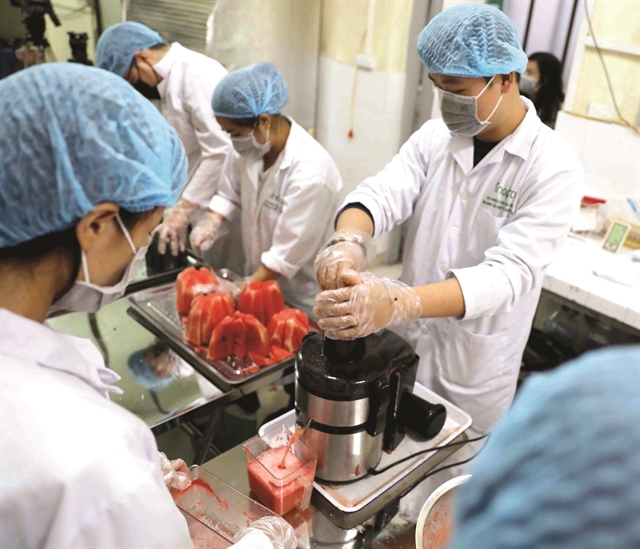
|
| The research group working on processing watermelon juice. VNA/VNS Photo Thanh Tùng |
Tân said in 2016, scientists at the institute succeeded in condensing fruit juice combining JEVA membrane processing.
“Fruit processing technology helps solve problems for farmers caused by abundant crops while prices drop,” she told Việt Nam News.
“JEVA technology helps enterprises gather fruits of varying quality levels to process into concentrate for export.
"The technology helps concentrate fresh fruit juice that normally cannot be preserved for a long time into concentrates with a longer expiry date,” she said.
The institute recently processed 750kg of watermelon into watermelon concentrate as an experiment in the past few weeks when watermelon set for export to China was stuck in the country as the northern border was de facto shut.
Tân explained that the membrane integrated JEVA technology evaporates at a moderate temperature and ambient pressure, making it highly suitable for the processing of heat-sensitive items like fruit juices.
“The technology brings a high-quality product that retains the natural flavour of the fresh juice and achieving very high dry matter (above 70 ° Brix),” she said.
Yet the most remarkable thing is that JEVA technology uses no chemicals and has a lower energy demand than the conventional thermal evaporation,” she noted.
“In addition to the main product, the concentrate, JEVA technology allows us to obtain a side product: the condensate with natural juice flavour, from which a kind of bottled water can be produced. Thus, JEVA can be considered a kind of zero-waste-technology. Hence, the operation of the equipment system does not cause harm to the environment.”
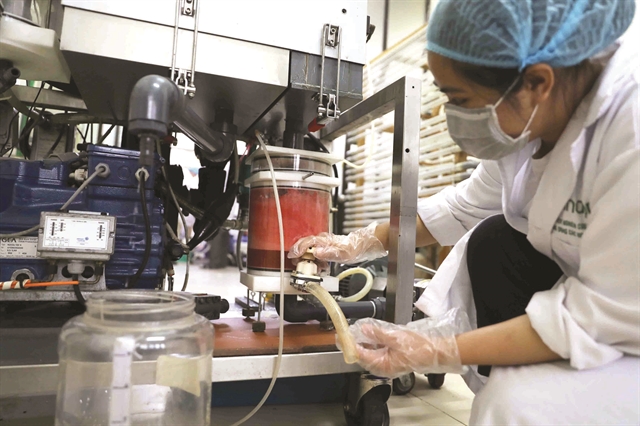
|
| The system is light, making it easy to carry from one place to others. VNA/VNS Photo Thanh Tùng |
One of the highlights of JEVA technology is that the processing line is quite small so can be easily moved and does not require comprehensive technical infrastructure to operate.
The final concentrate can be preserved at room temperature for a long time without any preservatives, according to the scientist.
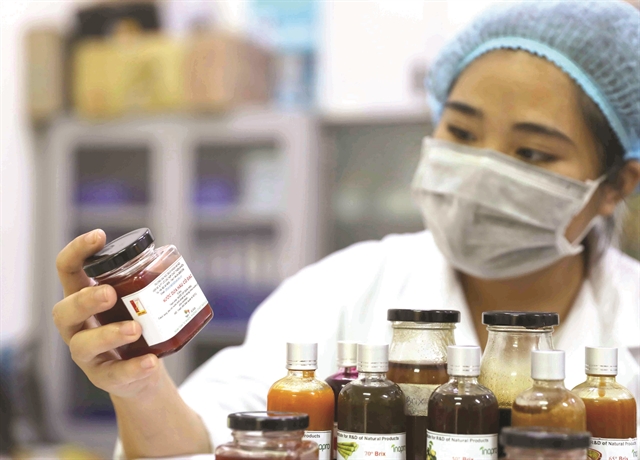
|
| Final condense fruit juice product. VNA/VNS Photo Thanh Tùng |
With 3-4 kg of fresh watermelon, a JEVA production line can produce 100ml of condensed juice that can be preserved for a year.
Effective technology
Senior student Đặng Thị Hòa, part of Tân’s research team, shares the same desire to support farmers.
“I was born into a farmer family so I know how hard a farmer's life is,” Hòa said. “I want to learn as much as I can from Prof Tân and other scientists here to create technology that can remove farmers’ burdens.”
Hòa said she was impressed with Prof Tân’s professional and effective working style.
“She is a famed scientist in the institute, who has inspired a lot of people including me,” Hòa said. “She is busy all the time, she moves all day round like a bee full of energy.”
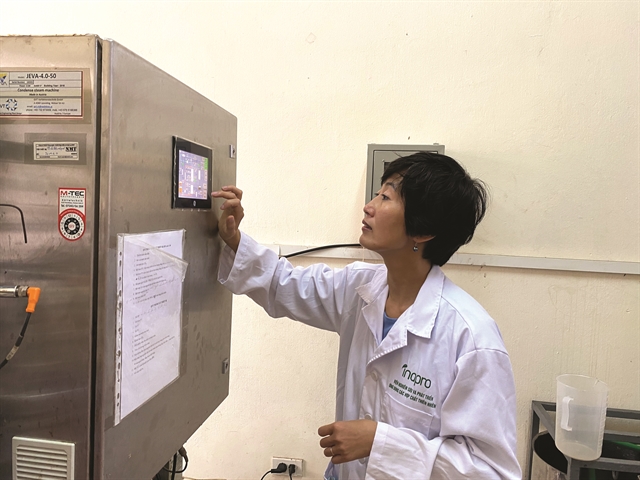
|
| Tân controls the JEVA system at her lab. VNS Photo Lê Hương |
Tân has trained her students to process fruit juice.
“I’m freer now, my students are fluent in the process,” Tân said. “I can supervise them from afar through the internet by following the statistics they record.”
Tân said her first research focus was on lychee processing for her post-doctoral research in Austria when her supervisor suggested she research in three fields, namely medicine, informatics and agricultural products.
“I thought of doing research on membrane technology,” she said. “I thought first of lychee, which is available on a mass scale in its season and the price drops at that peak time.
There had hardly been any lychee juice produced, only lychee canned with sugar solution for export.
“So why not lychee juice for the off-season period?” she said.
In 2013, her team began researching lychee.
She also extended the application of JEVA technology with honey, dragon fruits, watermelon, grapefruit, pomelo, orange, mandarin, peach, sugarcane, guava, and Nipa palm.
“I really find there is a close relationship between scientists and society,” she said. “I do research and develop technologies for dealing with hot issues and demands in real life, not to gain medals for souvenirs,” she said.
Tân said her JEVA production line was made with the help of many people, not by herself.
“The final result is high-quality products meeting social demands,” she said.
Besides doing research at the lab and teaching classes, Tân said she likes being active in German alumni networks (she studied for her PhD in Germany), cooking and being a friend to her children.
She's also a passionate advocate for women in science.
“I don’t think we should distinguish men’s and women’s strength in doing scientific research,” she said.
“I’m proud to be a woman and do not want to be prioritised because I'm a woman,” she said. “Then people would look down on women, who do not like that, for sure."
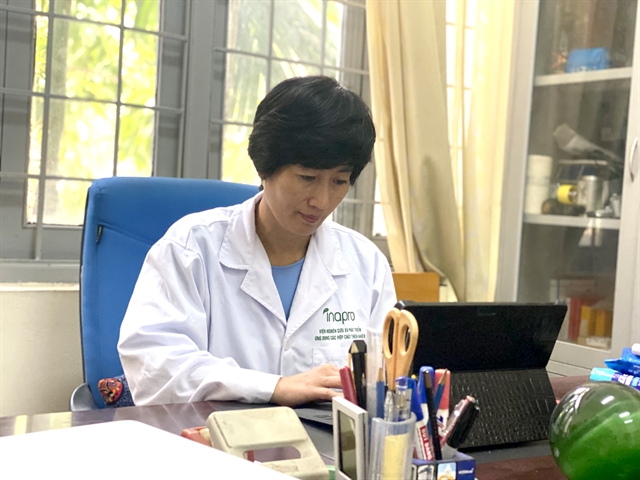
|
| Tân sets a good example for her students to follow. VNS Photo Lê Hương |
Tân said women have their own strengths in any profession.
“Women have flexibility in dealing with problems,” she said.
Above all though, Tân said she wanted to be a helpful person for society and always wants to have people calling her to ask: “Can you help us to deal with this problem?” VNS




